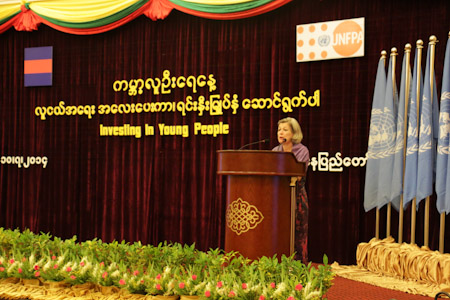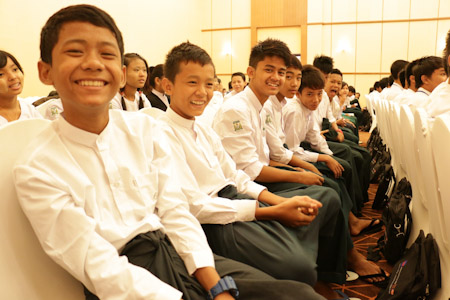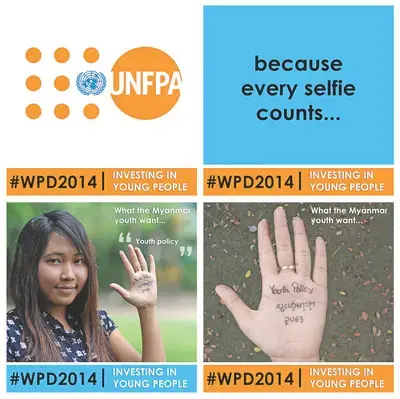Join the discussion on Twitter #WPD2014 or #YouthGoal
NAY PYI TAW, Myanmar - UNFPA and the Ministry of Immigration jointly organised World Population Day to re-energise commitment to investing in young people. A wide range of stakeholders from government, civil society, the United Nations, the diplomatic community and the youth of Myanmar attended the event.
Dr. Sai Mauk Kham, Vice President of the Republic of the Union of Myanmar, gave an opening address and elaborated on the significance of this year’s theme ‘Investing in Young People’. Emphasising why it is critical to invest in young people, he said, ‘There are 1.8 billion people aged 10 to 24 in the world, they make up one quarter of the world’s population.’ Turning his attention to Myanmar, Dr. Sai Mauk Kham said, ‘Young people aged 10 to 24 make up 30 percent of the total population in this country.’
Worldwide 69 million adolescents of lower secondary school age do not attend school. Poor access to reproductive and sexual health services contributes to unintended pregnancies, which is the leading cause of death among adolescent girls aged 15-19 in low and middle income countries. An estimated 515 million adolescents and youth live on less than $2 a day and approximately 75 million youth were unemployed in 2013.

Ms. Janet Jackson, UNFPA Representative for Myanmar, thanked the Union of Myanmar for their continued commitment to World Population Day. She stressed the significance of investing in young people, commenting that young people had previously been a theme of World Population Day. ‘Young people and youth face many challenges and issues around education, health, employment and gender equality. Today’s ceremony is about a commitment to ensure that their rights, health, education, employment and potential are protected, promoted and fulfilled and that these matters are on the nations’ post-2015 development agenda. It is time to for young people to take their place in the reform and development stage in Myanmar. Youth are a resource for today and a resource for the future of any country.’
Ms. Janet Jackson continued, ‘I applaud the efforts of the Department of Social Welfare in taking the lead in the development of a ‘National Youth Policy’ in Myanmar, with the involvement of stakeholders and young people.’ UNFPA is working with the Central Health Education Bureau, the Department of Health, Myanmar Medical Association and Marie Stopes International to provide support for adolescent and youth programmes, focusing on promoting comprehensive sexuality education, building capacity for health service delivery, and promoting youth leadership participation. Ms. Janet Jackson concluded her speech by emphasising, ‘It is time for young people to be at the very heart of national and global efforts.’

U Aung Tun Kaing, Deputy Director General of the Ministry of Social Welfare, Relief and Resettlement, presented a concept paper illustrating challenges that fifteen Myanmar youth groups had identified at an inter-generational dialogue meeting in Yangon on the 25th June 2014. He said, ‘Investing in young people is extremely important for the future economic development of Myanmar. We need to listen, protect, cooperate with and give responsibility to young people.’ Issues identified by youth representatives included; improving the health care of children and adolescents living with disabilities; improving access to basic education; improving youth networks; promoting opportunities for decent employment; and improving primary health care, HIV services and young peoples’ knowledge about health.
Concluding, Dr. Sai Mauk Kham said ‘Young people are the greatest asset of this country. I urge everyone to ensure children make a safe passage from adolescence into adulthood through education and employment opportunities, so that they can prosper and contribute to this country’s development.’
Traditionally World Population Day is celebrated internationally on the 11th July, however due to a national holiday, this year’s event was held on the 10th July 2014 in Myanmar.





